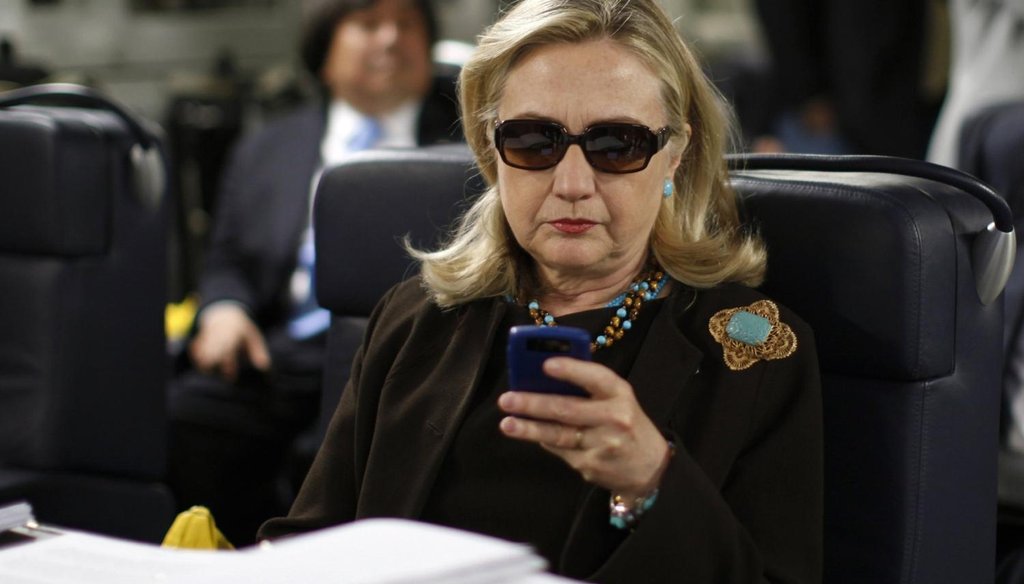Get PolitiFact in your inbox.

Hillary Clinton continues to face criticism for using a private email during her time as Secretary of State.
People defending Hillary Clinton on Sunday over revelations that she used a private email account as secretary of state offered a novel piece of evidence to bolster their argument.
While the State Department has asked all previous secretaries to turn over their private emails, only Clinton has complied, they claimed. "The State Department asked all secretaries of state to send their emails over, and she’s the only one who’s done it," Sen. Charles Schumer, D-N.Y., said on CBS’ Face the Nation.
Schumer’s claim rates Mostly False.
It’s not as though the letter went out to living secretaries of state dating back to Henry Kissinger or earlier. While it may be hard to remember a time before email, only four former secretaries have held the job during the prominence of electronic communications: Clinton, Condoleezza Rice, Colin Powell and Madeleine Albright.
Two of those individuals haven’t provided personal emails for good reason: They didn’t use email much during their time at the State Department. According to MSNBC, an aide for Albright said she "did not use email while she was in office" from 1997 to 2001.
Similarly, Rice, head of the State Department from 2005 to 2009, was not a habitual emailer either, according to multiple reports. As State Department spokeswoman Marie Harf noted, "Secretary Rice has repeatedly said that she did not regularly use email," and a spokesperson for Rice told ABC, "She did not use personal email for official communication as secretary."
And what about Powell, who served as Secretary of State during President George W. Bush’s first term? Powell appeared on ABC’s This Week to answers those questions.
Apparently, Powell can’t turn over any documents. Why? Because he doesn’t have them anymore.
"I retained none of those emails and we are working with the State Department to see if there's anything else they want to discuss with me about those emails," he said.
"I did not keep a cache of them. I did not print them off," he added. "I do not have thousands of pages somewhere in my personal files."
Harf in a briefing March 4 acknowledged that Powell had an "account has been closed for a number of years," and said, "He’s looking to see if there’s anything responsive he still has."
You can draw your own conclusions about Powell not saving official emails from a 10-year-old account, and about the relevance of that revelation to the Clinton controversy. Powell said most of his important correspondence would have been archived already since they were sent to staff who had State Department accounts.
But it does shed light on why Powell didn’t provide emails to the State Department, and it also demonstrates that he has taken steps to comply with the request, even if only recently.
So to recap. The State Department reached out to four former secretaries asking about personal email accounts. Two have said they rarely used email, the third did but had no records to turn over and the fourth was Clinton.
That makes Schumer’s defense fairly hollow.
Also on Sunday, Sen. Lindsey Graham, R-S.C., sought to downplay news that the U.S. economy added nearly 300,000 jobs in February.
"The labor participation rate is at an all time low," Graham told NBC’s Chuck Todd. "If your argument is that we’re on the road to recovery and we have a sound economy under President Obama, no, I don’t believe that at all.
Pointing out that the labor participation rate has been on the decline is a typical retort among Republicans, in response to arguments that the unemployment rate is shrinking. While low unemployment rate is generally a good thing, economists also say you want a high labor participation rate. That’s because the higher the rate, the more members of the working-age population that are actively seeking employment.
That said, Graham goes too far to in claiming today’s labor participation rate is at an "all-time low." His claim rates Mostly False.
As of February, the labor participation rate is 62.8 percent, according to the federal Bureau of Labor Statistics. That’s the lowest rate in about 37 years -- but not all time.
Rates were consistently lower than what they are today from 1948 through 1978 -- with the lowest point at 58.1 percent in December 1954. (Available data goes back to 1948.)
Much of the increase in the labor participation rate in the second half of the 20th century largely has to do with a massive increase in the number of women seeking employment, as a result of changes such as better access to contraceptives and anti-gender discrimination legislation, according to an economic report by the White House, citing Bureau of Labor Statistics data.
This major social difference in the country’s workforce makes it difficult to compare labor participation rates today to those 50 years ago.
Another important reason for labor participation rate increase through the 1990s was the fact that baby boomers reached their "peak working years," according to the report.
Factors contributing to current decline are up for debate.
On the one hand, there’s concern that people are discouraged about their job prospects. The slow recovery from the recent recession may have prompted people to go back to school, stay at home with their kids or give up on a job search altogether.
But absent the recession, labor participation would have dropped anyway, Brookings economist Gary Burtless told PolitiFact. Why? Because the baby boomers have started to retire.
And as the population gets older, fewer people will be working overall, meaning the labor participation rate will continue to decline in the coming decade, according to the Bureau of Labor Statistics.
Our Sources
See individual fact-checks.






















































